The survey was unscientific. Nevertheless, the results were a bit surprising (and valuable) to me. Perhaps they might reflect your situation as well. Maybe you are facing similar challenges in 2010 to improve your strategy effectiveness. You can download the survey here and view the complete set of results here.
The respondents answered five basic questions about strategy facing their organization or work group in the year ahead. The fourteen organizations mostly represented high technology companies ranging in annual revenues from $30M to greater than $10B. However, there were also startups and nonprofits included.
Here were the questions that I asked.
- What is your relationship to strategy decision makers in your company or work group?
- What types of strategy do you influence or decide in your company or work group?
- How would you assess your company’s or work group’s strategy effectiveness?
- What critical strategy challenges does your company or work group face in 2010?
- What types of strategy help would help you most?
From the (admittedly) small sample, several interesting responses jump out.
Most of the people were involved in strategies at the business or product level. The survey included fewer that had responsibilities for financial, mergers & acquisitions or alliance strategies.
Each person ranked their strategy efforts across a few categories on a scale from one to five (5 = best performance). The categories included developing strategy, communicating strategy, executing strategy, reacting to competitors and so on. I averaged the ratings across all categories for each company to produce a composite rating. The distribution is shown below. The fascinating (though not entirely surprising) finding is that more than 50% of the organizations were rated no better than average (3 = average performance). Average is not likely to be good enough in 2010 (if it ever was).
Looking more at the detailed ratings, it becomes clear that most organizations rated themselves higher on the front end activities of strategy (i.e., developing, communicating, executing) and lower on those on the back end (i.e., ongoing management, evaluating, reacting to competition). To the extent this is true, it reflects a great vulnerability that a strategy may start strong but finish weak in the organization or market place.
Given where companies rate themselves, where do they see the challenges in 2010? The number one response was that they needed ways to gain new competitive advantages. Would not that require above average strategy performance? Or, maybe it would require better competitive positioning. Then, throughout the year, would not strategies need to be evaluated better to support adjustments to the strategies? The net is that the recognition of the challenge is dead on but that current performance of many organizations inhibits them from successfully closing their strategy gaps.
Assuming that they could have anything, what kind of help would people like with their strategies in 2010? I speculated before the survey that most might want help formulating the strategy. For example, what are the new products to introduce and how should they be marketed? Perhaps many would want help analyzing the competitive environment. Neither of these two possibilities garnered the most responses. Instead, most people simply wanted someone with experience to talk with about their strategy and to reflect on their plans.
There are many smart people working diligently on business and competitive strategy in 2010. It is not news to them that the environment is tough or that their companies’ have high expectations about the strategies. Neither is it news that their strategy efforts need to improve. For those people, the best thing to do may be to talk to someone that they trust to reflect with them about what to do better.
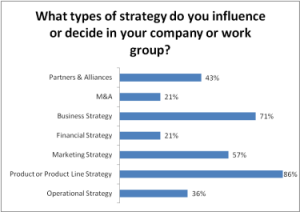
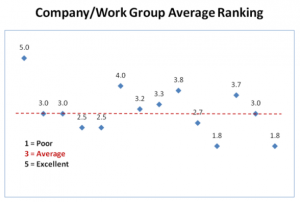
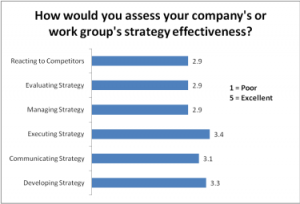
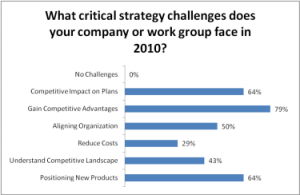
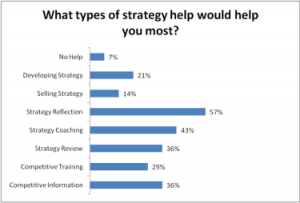
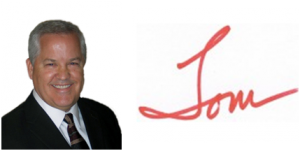

[…] This post was mentioned on Twitter by Tom Hawes, August Jackson. August Jackson said: Google Reader: Strategy Help: Someone to Talk With http://bit.ly/4xORCb […]
I think this tell us that people are better about planning and thinking, but not so strong on execution. Execution takes guts and that seems to be in short supply. It also takes a lot more effort to execute than to plan since it’s actionable.
Thanks for sharing!
Ellen, I agree with you. Also, I think that it points out that people want to talk about their work and (in some cases) don’t have the time or trustworthy relationships to do so. My experience is that meaningful reflection with an experienced, trusted co-worker (or consultant) improves my thinking immensely.
Tom
[…] the original post: Strategically Thinking » Strategy Help: Someone to Talk With Share and […]